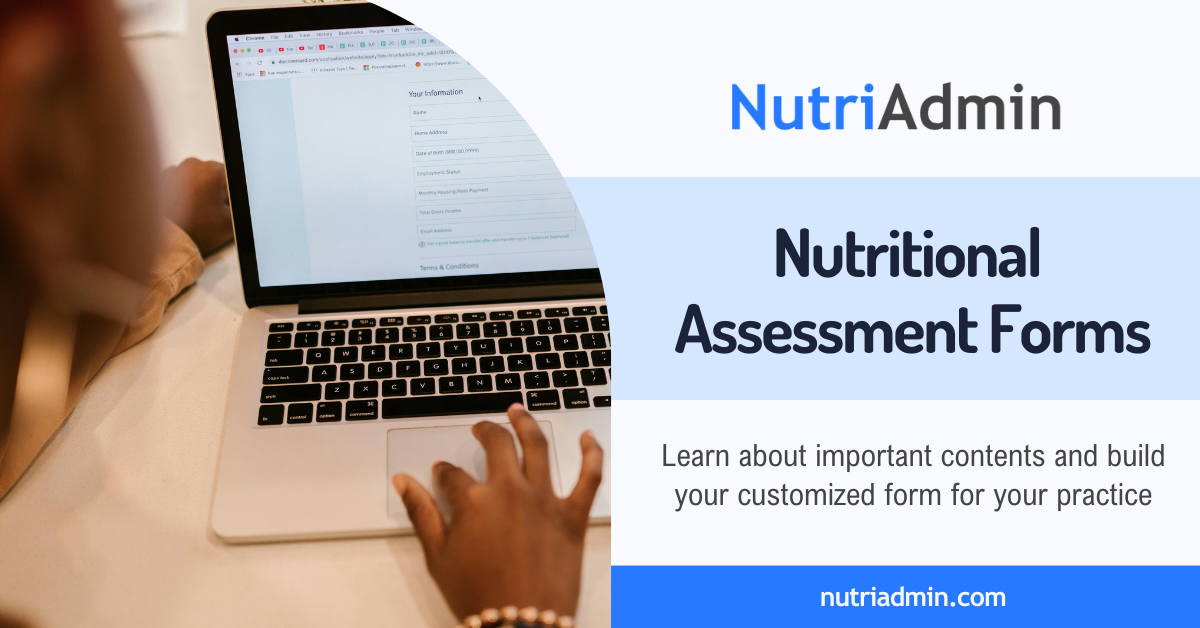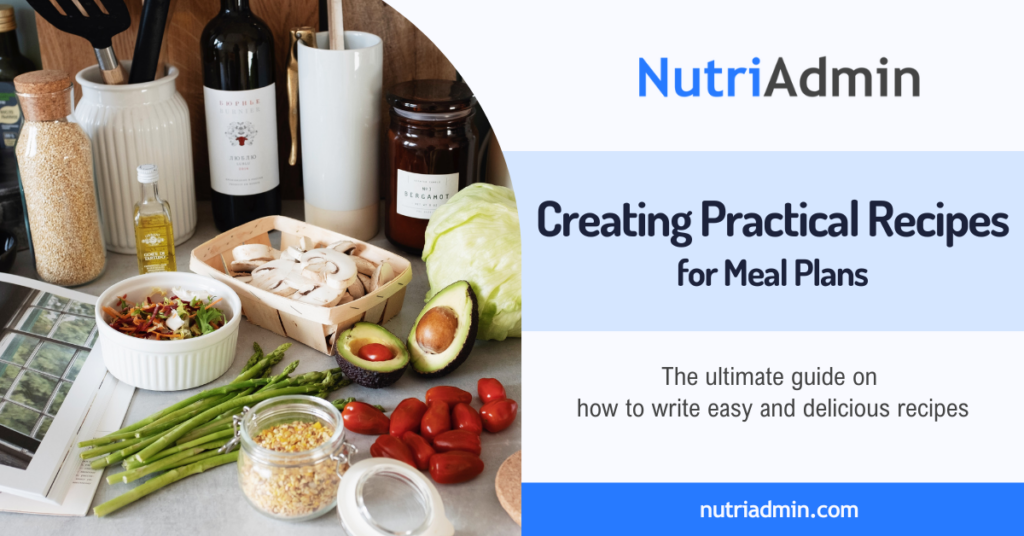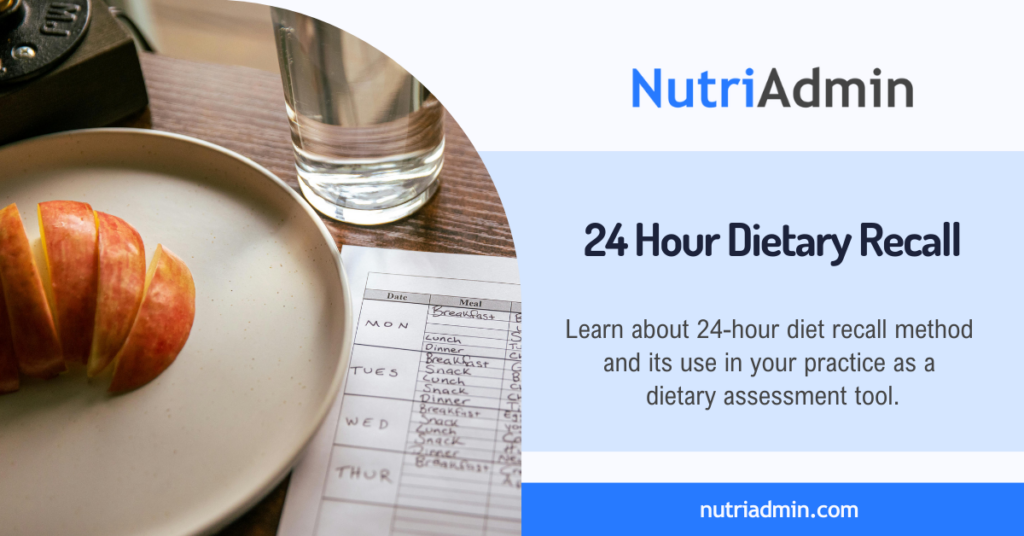Nutritional assessment forms are important tools used by dietitians and nutritionists to gather information about a client’s nutritional status, dietary habits, lifestyle, health conditions and history, and anything related to nutrition. The nutritional assessment forms can take the form of a paper document that clients fill out in nutrition clinics, an editable document or PDF file sent by the practitioner, or through online tools like Google Forms. Some professional nutritionist software also provides a means to send such forms as questionnaires.
I’m Lucy, a Registered Nutritionist Dietitian. From my student years to several years of working in various nutrition fields, I’ve encountered and used different nutritional assessment forms.
In this article, I’ll share my knowledge about nutrition assessment, and discuss what nutritional assessment forms typically include. I will also highlight the differences among nutrition assessment forms used by nutrition practitioners.
If you read until the end, you can even download free nutritional assessment form PDF and Word documents that you can use or customize according to your needs. A sample online nutrition questionnaire from professional nutrition software is also provided.
What is Nutrition Assessment?
Before we delve into the topic of Nutritional Assessment Forms, it’s important to understand the purpose of these forms. To do this, we need to understand what nutrition assessment is.
Nutrition assessment is a method of gathering vital information to identify nutrition problems and their causes. It involves continually comparing a client’s status against accepted standards or goals and making adjustments as needed. Consequently, this process allows practitioners to formulate a nutrition diagnosis and appropriate intervention.
Nutrition assessment is ongoing and dynamic, enabling practitioners to track changes in behavior, nutritional status, and the effectiveness of interventions over time.
In the Academy of Nutrition and Dietetics website’s Nutrition Care Process guide, terminology for nutrition assessment is categorized as shown below:
- Food/Nutrition-Related History
- Anthropometric Measurements
- Biochemical Data, Medical Tests, and Procedures
- Physical Exam Findings
- Client History
- Assessment, Monitoring and Evaluation Tools
- Etiology Category
- Comparative Standards
- Progress Evaluation
Knowing these categories can assist you in formulating your own customized nutritional assessment form, as they provide the foundational data needed for such forms.
What Does a Nutritional Assessment Forms Include?
A nutrition assessment form typically includes a series of questions covering various aspects of the client’s information. However, depending on their specialization and setting, every nutritionist or dietitian tailors their approach, utilizing similar content but focusing on specific information essential to their client’s needs.

Generally, these are the common contents included in the nutritional assessment forms that nutritionists and dietitians use.
Client Information
Nutritional assessment forms typically include basic personal details like the client’s name, age, gender, and contact information. These details ensure accurate communication and identification. For instance, having the client’s name helps address them properly, while age and gender provide context for understanding their nutritional needs. Additionally, contact information allows for easy communication between the client and the practitioner.
Dietary intake
Dietary intake questions aim to gather information about the client’s eating habits, preferences, and any dietary restrictions they may have. Consequently, by understanding these factors, nutritionists and dietitians can provide tailored recommendations to promote healthier eating and address any nutritional concerns. Methods such as 24-hour food recall, food frequency questionnaires, or food diaries help gather detailed information about the client’s dietary intake over time, supporting personalized nutrition interventions.
Nutritional goals
Nutritional goals help individuals achieve their desired outcomes. This includes:
- weight loss
- muscle gain
- improved athletic performance
- disease management
- or overall health and wellness
By identifying these goals through the nutritional assessment form, practitioners can customize their recommendations to meet the individual’s specific objectives. This ensures that the nutrition plan is effective and aligned with the client’s needs, leading to positive changes in their dietary habits and overall health.
Medical history
Medical history is crucial in nutritional assessment forms as it provides vital information about the client’s health. Additionally, by gathering details about any chronic conditions, medications, and family medical history, dietitians can tailor their recommendations to address specific health concerns. Moreover, this ensures compatibility with existing treatments or dietary restrictions. This helps promote overall well-being and supports the client’s goals effectively.
Physical activity levels
Assessing physical activity levels in nutrition assessment forms helps nutritionists and dietitians understand the client’s lifestyle and energy needs. Therefore, by knowing the client’s activity level and exercise habits, practitioners can tailor dietary recommendations to support their energy requirements effectively. Consequently, this ensures that the advice provided is personalized and aligned with the client’s goals for health and wellness.
Lifestyle factors
Considering lifestyle factors in nutritional assessment forms is important as they provide a comprehensive view of the client’s health. Exploring factors like stress levels, sleep patterns, and other habits helps practitioners understand how these aspects may influence nutrition and overall well-being. By addressing these lifestyle factors, practitioners can offer personalized recommendations to support the client’s health goals effectively. Additionally, this ensures that the advice provided is tailored to the client’s unique needs.
Variations in Creating Nutrition Assessment Forms
Every nutritionist and dietitian creates nutritional assessment forms tailored to their specialization. For instance, a dietitian catering to cancer patients may include questions specific to cancer, such as diagnosis date, type of cancer, stage, treatments, and medications.
Another example is when a weight loss nutritionist includes detailed questions or sections related to eating habits. It will typically include 24-hour dietary recall or food diaries, as well as lifestyle-related questions. This way, they can learn about the client’s motivation to lose weight and identify areas for improvement.
Conversely, a sports nutritionist may incorporate more sports and fitness-related questions, such as the client’s specific sport, weight goals for boxers, or participation in activities like triathlons and training regimens.
Ultimately, the content of the form depends on the information necessary to formulate a nutrition diagnosis and nutrition care plan for each client. While the form may not be exhaustive initially, it evolves over time as practitioners gain more insights into their client’s needs.
Free Nutritional Assessment Form Template
Now that you know how to create your customized nutritional assessment form, it is still important to have an actual example. This is to help you visualize how nutritional assessment forms look in different modes used by other nutritionists and dietitians, such as PDF, Word Doc, and professional nutritionist software like NutriAdmin.
Nutritional Assessment Form Editable Word Document
When using a Word document for the nutritional assessment form, you can either send it directly to your client via email or print it out to be filled during face-to-face consultations. You can download our free template below:
PDF Form, Nutrition Assessment Form
The PDF form can be useful when you want to print out a nutritional assessment form and have the client write their answers. Additionally, you can download a free PDF generated through NutriAdmin below.
Nutritionist Software Questionnaires
There are several professional nutrition apps that have a feature to send questionnaires to clients, including the nutritional assessment form. Moreover, this feature is available in NutriAdmin. It allows you to send questionnaires to clients through email or the client portal. You can also have it as a widget on your website. Alternatively, you can get the link to your questionnaire and send it to your clients through emails, or messaging apps.
You can try out how the online questionnaire feature in NutriAdmin by clicking the phrase below. To try to fill in the questionnaire, we require your email address. By submitting your email, you agree to receive marketing communications from us. You can unsubscribe at any time. Please note that the data you submit in this form will be destroyed; it is solely for demo purposes.
Learn more about this feature through our Online Customizable Questionnaires page.
Also, if you’re already a NutriAdmin user and want this form added to your account, please drop us an email at team@nutriadmin.com, and we will add it for you.
Summary
The Nutritional Assessment Form is one way to gather client information. While an interview during an initial consultation is crucial, this form can provide an overview of the client’s status. Additionally, it can serve as a guide during the consultation for parts needing clarification and emphasis. It will also serve as a record of your client’s relevant information for future reference.
The content of the form also varies depending on the practitioner’s niche or specialization. This is because every person has a different goal or reason for consulting with a nutritionist or dietitian.




